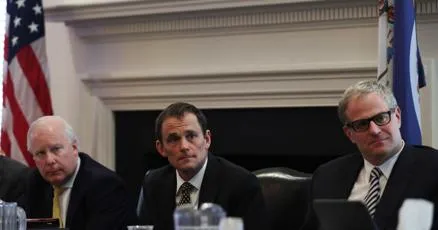CHARLOTTESVILLE -- University of Virginia faculty want answers about President Jim Ryan's abrupt resignation under pressure from the Trump administration, but the school's governing Board of Visitors isn't talking.
The full Faculty Senate, the 82-member body that represents UVa's roughly 3,200 faculty members, is weighing just how it plans to express its disapproval in the board's handling of the situation: either a censure or a vote of no confidence.
The former would be a formal statement condemning the board, the latter could demand further resignations, but neither would restore Ryan to his prior office, which he officially departed Friday.
Should the Faculty Senate issue a resolution of no confidence in the Board of Visitors, it will be the first time since President Teresa Sullivan's ouster. That vote was considered at the time an unprecedented move.
As faculty senators consider their options, the Senate's Executive Council hosted the university's new rector, Rachel Sheridan, and vice rector, Porter Wilkinson, at a meeting Wednesday. Sheridan and Wilkinson did not appear in person but rather via Zoom.
The meeting followed a resolution the Senate passed June 27, the day Ryan tendered his resignation, calling on the board to meet with the Faculty Senate to "clarify the circumstances and negotiations that led to the resignation."
Sheridan and Wilkinson, however, prefaced the conversation Wednesday by saying legal counsel had advised them not to speak about Ryan's resignation or the Department of Justice's investigation into the school's diversity policies. As a result, nearly every question from the Senate's Executive Council met the same response.
"I unfortunately cannot comment on that. I wish I could," Sheridan said at least six times during the meeting.
Some of the questions asked that received no answer:
- Are there any requirements or limitations that the board is receiving from Washington regarding who can be picked as the interim or full-time president?
- Did the DOJ directly contact anyone on the board to convey the message that Ryan must resign or there would be consequences?
- Did the Board of Visitors or any of its members meet to deliberate about the DOJ threats?
Sheridan and Wilkinson did speak on the board's plans to find an interim replacement for Ryan. UVa COO J.J. Davis is now acting president of the university, and she is to serve in the role until an interim president can be appointed by the board. Sheridan and Wilkinson both expressed a desire for the interim president to be an internal hire.
"My instinct is that we should identify someone, ideally, from the university who's already familiar with university operations and university rules and has the stature internally at the university that could lead forward," Sheridan said.
No candidates were mentioned by name, but Wilkinson said the board is hoping to set up a website where anyone in the university community can submit recommendations for both the interim and full-time presidents.
While Sheridan emphasized that the board will make the final decision, she said she wanted to collaborate with the Faculty Senate in the search for the university's 10th president.
Sheridan and the other members of the 17-strong Board of Visitors have been tight-lipped about Ryan's resignation. She and outgoing Rector Robert Hardie co-authored a letter on June 30, Hardie's last day on the board, but it said nothing about the board's involvement, or lack thereof, in Ryan's departure.
"We share the sentiments of so many members of the University community who have expressed their sorrow about President Ryan's resignation and their appreciation for his remarkable service to the institution,"
the letter reads. "Based on his outstanding record as president, it should come as no surprise that one of Jim's last acts in office put the needs of the University ahead of his own."
Many have blamed the board, which is now fully staffed by Republican Gov. Glenn Youngkin's appointees, for not doing more to save Ryan and fight the DOJ.
Ryan tendered his resignation June 27 after the New York Times reported the day before that the DOJ had been campaigning for him to step down over his failure to dismantle the diversity, equity and inclusion programs he had established at the school. Further, DOJ officials claimed Ryan misrepresented UVa's efforts to eliminate the university's DEI apparatus and accused him of rebranding programs instead of removing them.
While Ryan heralded DEI as a way to address and correct historical and systemic injustices and inequalities for minorities at UVa, his detractors have said DEI swings the pendulum too far in the other direction, sacrificing merit for minority status among students, faculty and staff.
President Donald Trump issued an executive order April 23 demanding American colleges eliminate their DEI programs and policies. Trump's administration has been explicit: Those that do not risk losing millions of dollars in federal funding.
"To make a long story short, I am inclined to fight for what I believe in, and I believe deeply in this University. But I cannot make a unilateral decision to fight the federal government in order to save my own job,"
Ryan wrote in a letter to the university community the day he tendered his resignation. "If this were not so distinctly tied to me personally, I may have pursued a different path. But I could not in good conscience cause real and direct harm to my colleagues and our students in order to preserve my own position."
How the board proceeds with replacing Ryan, both on an interim and permanent basis, may be complicated by more than censures and votes of no confidence.
Democrats in the state Senate are currently feuding with the governor's office after a Senate panel refused to confirm one of Youngkin's appointments to the board: former Virginia Attorney General Ken Cuccinelli.
Cuccinelli continues to attend board meetings, but the Senate's top Democrats have filed a preliminary injunction that would block Cuccinelli from joining the board until the matter can be resolved, either in court or in the legislature.
